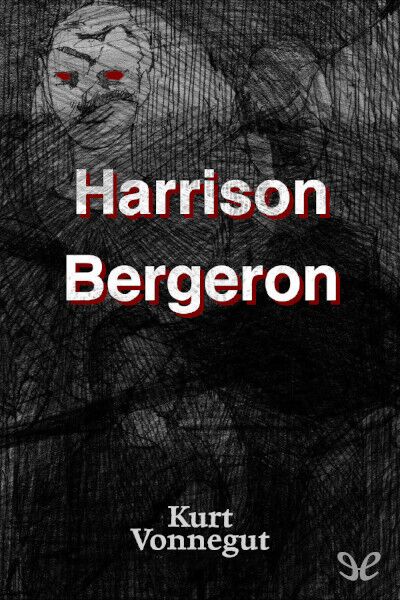Summary: Harrison Bergeron by Kurt Vonnegut
It is the year 2081. Because of Amendments 211, 212 and 213 to the Constitution, every American is fully equal, meaning that no one is stupider, uglier, weaker, or slower than anyone else. The Handicapper General and a team of agents ensure that the laws of equality are enforced.
One April, fourteen-year-old Harrison Bergeron is taken away from his parents, George and Hazel, by the government and to a place unknown. But what happens in the aftermath will challenge the status quo and inspire his peers about the hidden potential within one’s own individuality.
Review: Harrison Bergeron by Kurt Vonnegut
Harrison Bergeron is a dystopian satire written by Kurt Vonnegut and first published in 1961. The story imagines an egalitarian future in which individuals with above-average talent and intelligence are artificially handicapped to prevent them from dominating others. When the story’s teenage protagonist rebels against this system, tragic consequences ensue. Through dark humor and hyperbole, Vonnegut crafts a vivid totalitarian world to provide commentary on enforced equality, freedom of the individual, and governmental control.
The story is set in 2081 when amendments to the US Constitution aim to make all citizens completely equal. Strong, intelligent, or attractive people must wear physical and mental handicaps prescribed by the United States Handicapper General. For instance, graceful dancers wear heavy weights, and intelligent thinkers have distracting radio signals transmitted into their ears. Without these handicaps, they could overwhelm others and gain unfair advantages. The narrative focuses on George and Hazel Bergeron, average citizens watching television when a news bulletin announces their son Harrison has escaped from jail.
Harrison is revealed to be a genius and extraordinarily gifted athlete. He was imprisoned after refusing to wear state-imposed handicaps. The television suddenly shows the fourteen-year-old Harrison bursting into a theater and declaring himself the new Emperor before removing his handicaps. He calls for a beautiful ballerina, also handicap-free, to join him. They begin dancing together beautifully and defiantly. However, the Handicapper General arrives and kills them both with a shotgun. The story ends with George and Hazel quickly forgetting the incident and distracting themselves with trivialities.
Vonnegut’s exaggerated version of equality enforced by a totalitarian government satirically highlights flaws in applying egalitarian ideals too literally. Individual strengths and weaknesses are part of the human condition. Forcibly achieving equality by restricting talent and intelligence can undermine freedom and human dignity. True equality should empower society’s least advantaged while celebrating diversity, not dragging down the gifted.
The story also cautions against governmental overreach and regulation of citizens’ lives and abilities. The dystopia depicts a system in which the state actively impedes personal potential in the name of an ambiguous “common good.” Individual excellence is treated as inherently unfair, disregarding its social value. The absurd handicaps suggest regulation taken too far can breed mediocrity and conformity while suppressing achievement. Vonnegut implies enforced equality can ultimately dehumanize us all.
Harrison represents individualism and freedom of thought, while the Handicapper General symbolizes an authoritarian system demanding total compliance. Their conflict dramatizes tensions between individual rights and collectivist ideals. Harrison’s defiance and creativity contrast with the bleak conformity of his handicapped peers. His call to the ballerina to join him in free self-expression suggests art and culture suffer when totalitarian governments limit human potential. Their immediate deaths at the hands of the state demonstrate an authoritarian system’s swift, violent suppression of dissent.
The story’s darkly absurdist humor critiques governmental overreach and flaws in utopian striving. Visual absurdities like dancers weighted down with bags of birdshot highlight the ridiculousness of suppressing talent. Radio signals broadcast into intelligent minds satirize the regulation of thought itself. Vivid hyperbole imagines the logical extreme of enforcing physical and mental equality among citizens. By portraying an absurd system most would reject, Vonnegut prompts readers to consider which governmental controls over equality and achievement may be problematic or unethical.
The passive reactions of George and Hazel Bergeron represent conformity and loss of individuality under authoritarianism. They blithely accept their son’s televised murder, unable to grasp the broader significance of what they have witnessed. Their limited attention spans and superficial concerns symbolize diminished intellect and humanity. Through their characterization, Vonnegut suggests societies that overregulate human potential reduce citizens to passive, easily manipulated drones stripped of free thought and critical reasoning abilities.
While exaggerating for effect, the story extrapolates real twentieth-century egalitarian movements to a dystopian extreme as a cautionary tale. Written during the Cold War, its setting in 2081 evokes communism’s promised utopian future in which class differences disappear. Vonnegut suggests this ideal of equality could become authoritarian and restrictive rather than empowering when taken too far. The story remains relevant today as debates continue on regulating citizens and elites for various social goals. By vividly imagining an exaggerated dystopia, Harrison Bergeron prompts consideration of governmental overreach and suppression of individuality even in free, democratic societies.
Harrison Bergeron showcases Vonnegut’s signature satirical style. Through dystopian fiction, he sharply criticizes real-world social and political dynamics. The story’s exaggerated setting makes its themes more potent as readers recognize satirical hints at greater truths about human nature and societies. Its dark humor casts egalitarian striving in a dystopian light to provoke questions about governmental authority, individual potential, and the rights of the gifted. As a distilled satire, Harrison Bergeron continues to resonate as debates around equity, privilege, and restriction of talent persist into the modern day. Its warning about utopian striving giving way to restrictive authoritarian systems remains as relevant as ever.





